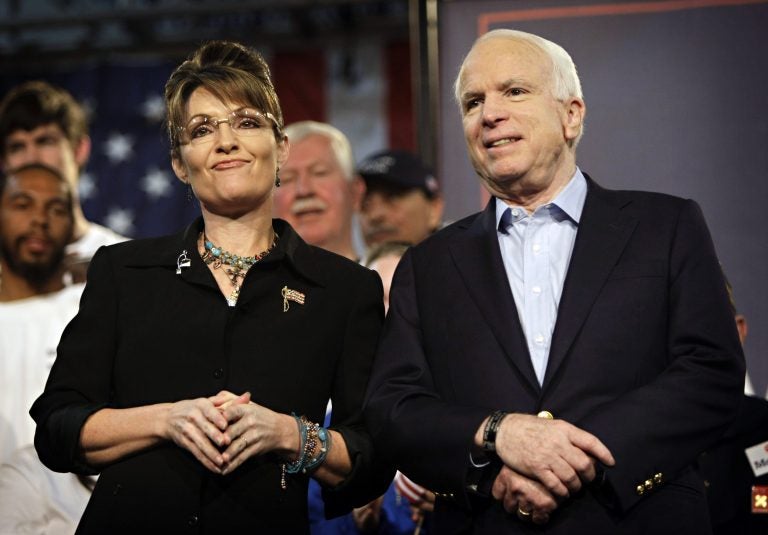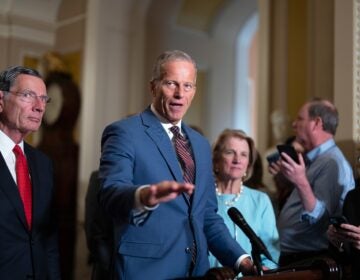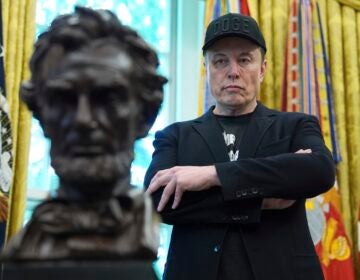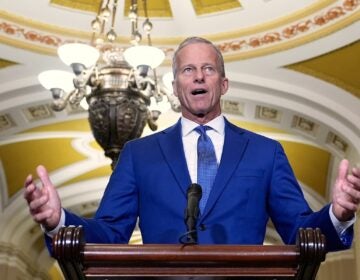McCain regrets picking Sarah Palin. Now he tells us.
John McCain, seriously ailing in Arizona, writes in his farewell book that he regrets picking Sarah Palin as his '08 running mate.

U.S. Sen. John McCain, R-Ariz., and Sarah Palin (AP Photo/Matt York)
John McCain, seriously ailing in Arizona, writes in his farewell book that he regrets picking Sarah Palin as his ’08 running mate. I should think so. It’s a major stain on McCain that he helped unleash the forces of ignorance that have culminated in Donald Trump.
McCain wanted to tap his friend Joe Lieberman for the veep slot, but his advisers told him that picking a pro-choice Democratic senator would trigger a right-wing walkout at the GOP convention and prompt “the base” to boycott election day. McCain writes, “It was sound advice that I could reason for myself. But my gut told me to ignore it and I wish I had.”
Yeah, so do we. It was clear during the summer of ’08 that the odds were heavily against McCain no matter what he did – after eight years of George W. Bush, voters were primed for what Barack Obama offered – and his options were grim: Lose big because “the base” wouldn’t abide Lieberman, or lose big because independent swing voters wouldn’t abide a running mate who trafficked in cheap demagoguery and fact-free buffoonery.
So McCain went with Palin, whose knowledge of American governance and history was roughly on a par with a sixth-grade civics class slacker. She was the first candidate on a contemporary national ticket to give voice to the angrily ill-informed, to stoke white grievances, to radically dumb down the standards for public service. Within the Republican base, she fertilized the turf for Trump.
We’ve grown accustomed to Trump’s incoherent word salads, but 10 years ago it was truly shocking to hear a candidate talk like this: “Our next-door neighbors are foreign countries, there in the state that I am the executive of. As Putin rears his head and comes into the air space of the United States of America, where do they go? It’s Alaska. It’s just right over the border. It is from Alaska that we send those out to make sure that an eye is being kept on this very powerful nation, Russia, because they are right there, they are right next to our state.”
It was shocking to hear a candidate flunk basic exams, like not knowing there were two Koreas and not knowing that the Queen of England was only a figurehead. And when asked to name a Supreme Court ruling that she disagreed with, aside from Roe v. Wade, she said: “Well, let’s see. There’s – of course – in the great history of America rulings there have been rulings, there’s never going to be absolute consensus by every American. And there are those issues, again, like Roe v. Wade where I believe are best held on a state level and addressed there. Well, I could think of – of any again, that could be best dealt with on a more local level. Maybe I would take issue with. But you know, as mayor, and then as governor and even as a Vice President, if I’m so privileged to serve, wouldn’t be in a position of changing those things but in supporting the law of the land as it reads today.”
It was shocking at the time to hear a candidate spout alternative facts that had no basis in reality, like when she said that Alaska produces “nearly 20 percent of the U.S. domestic supply of energy.” (The actual stat, according to Bush’s energy department, was 3.5 percent). She later tried to revise her statement by insisting that Alaska produces “nearly 20 percent of the U.S. domestic supply of oil and gas.” (The actual stat, according to the feds, was 7.4 percent.)
It was also shocking to hear a candidate boast that she regularly read newspapers and magazines, yet couldn’t name a single one of them: “I’ve read most of them…Um, all of them, any of them that have been in front of me all these years.”
And, worst of all, it was shocking at the time to hear a national candidate play the demagogue: “I believe that the best of America is in these small towns that we get to visit, and in these wonderful little pockets of what I call the real America, being here with all of you hardworking, very patriotic, um, very, um, pro-America areas of this great nation.”
Nobody questions John McCain’s devotion to his country, and his detestation of Trump is widely welcomed. But it’s a fact of history that picking Palin helped pave the road for Trump. She sowed the wind, he reaped the whirlwind. It’s a fact of history that McCain helped popularize the sick notion that even the most ill-qualified are deemed fit for high office, that expertise and the lack thereof are essentially equal.
Back in 1970, a senator named Roman Hruska tried to defend an ill-qualified Supreme Court nominee with this reasoning: “So what if he is mediocre? There are a lot of mediocre judges and people and lawyers. They are entitled to a little representation, aren’t they?”
Well, they’re getting representation now. And McCain’s regret, for what he calls his “mistake,” comes way too late.
WHYY is your source for fact-based, in-depth journalism and information. As a nonprofit organization, we rely on financial support from readers like you. Please give today.




